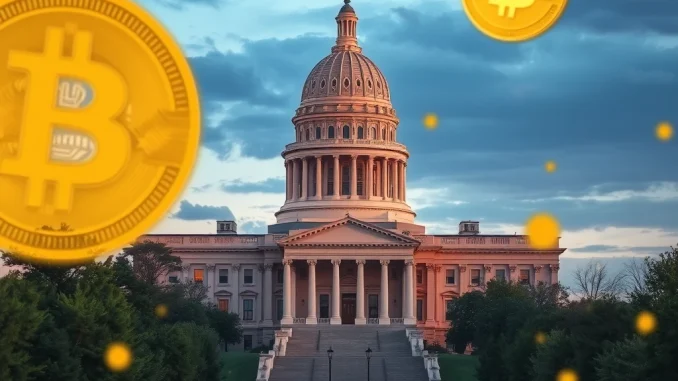
Big news from the Lone Star State! For anyone following the convergence of government policy and digital assets, the recent move by Texas is certainly grabbing attention. The Texas House has officially given its nod to SB21, a bill with the significant aim of creating a Texas Bitcoin reserve. This development, reported by Watcher Guru on X, marks a notable step in how states might interact with and potentially leverage cryptocurrencies.
What is SB21 Texas All About?
At its core, SB21 Texas is legislation proposing the establishment of a state-managed reserve holding Bitcoin. Think of it like a strategic petroleum reserve, but for digital currency. The idea is to acquire and hold a certain amount of Bitcoin, potentially for various reasons ranging from economic strategy to asset diversification or even preparing for future financial landscapes where digital currencies play a larger role.
While the specifics of the bill regarding the size, acquisition method, and management of the reserve would be detailed within the legislative text, the fundamental principle is the state holding a significant amount of a decentralized digital asset. This move signals a level of institutional acceptance and forward-thinking from Texas lawmakers regarding the potential value and utility of Bitcoin.
Why is Texas Interested in a Strategic Bitcoin Reserve?
Texas has long positioned itself as a hub for innovation and business-friendly policies, and this extends to the cryptocurrency space. Several factors likely contribute to the state’s interest in a strategic Bitcoin reserve:
- Pro-Innovation Stance: Texas has actively courted the crypto mining industry and blockchain companies, recognizing the economic potential. Establishing a reserve aligns with this pro-digital asset environment.
- Economic Diversification: Holding a non-traditional asset like Bitcoin could be seen as a way to diversify state holdings beyond traditional investments.
- Potential Store of Value: Proponents of Bitcoin view it as a potential hedge against inflation and a store of value, characteristics that could appeal to long-term state financial planning.
- Attracting Investment: By embracing Bitcoin at a state level, Texas could further solidify its reputation as a leading jurisdiction for blockchain and crypto businesses, potentially attracting more investment and talent.
- Leading in Digital Assets: This move could position Texas as a leader among U.S. states in adopting and utilizing Texas digital assets, setting a precedent for others.
What Does This Mean for the Future of State-Level Crypto Adoption?
The approval of the Texas crypto bill SB21 by the House is a significant indicator. It suggests that state governments are moving beyond just regulating cryptocurrencies and are beginning to explore ways to actively incorporate them into their financial strategies. This could pave the way for other states to consider similar measures, potentially leading to a patchwork of state-level digital asset policies and reserves across the country.
However, challenges remain. Bitcoin’s price volatility is a primary concern for any large-scale reserve. Security for storing such a valuable digital asset is paramount. There are also ongoing questions about the regulatory landscape at both state and federal levels regarding how these reserves would be managed and accounted for.
This development is certainly a landmark moment for the integration of digital currencies into traditional governmental finance. It reflects a growing recognition of Bitcoin’s permanence and potential influence in the global economy.
Summary
The Texas House’s approval of SB21 to establish a Texas Bitcoin reserve is a groundbreaking development in the realm of state-level digital asset adoption. It highlights Texas’s commitment to innovation and its view of Bitcoin as a potentially valuable strategic asset. While the bill still needs to navigate further legislative steps, its passage through the House signals strong momentum. This move could have significant implications, not only for Texas’s financial strategy but also for encouraging other states to explore similar initiatives, further embedding digital assets into the financial future.



